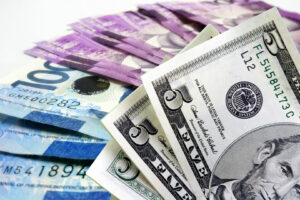By Beatriz Marie D. Cruz, Reporter
THE NATIONAL Government’s (NG) outstanding debt hit a fresh high of P15.69 trillion as of end-July amid an increase in domestic and external borrowings, the Bureau of the Treasury (BTr) said.
Data from the BTr on Tuesday showed that the NG’s debt level rose by 1.33% as of end-July from P15.48 trillion as of end-June.
“The NG’s debt portfolio has increased by P206.49 billion or 1.3% from the end-June 2024 level, primarily driven by the net issuance of both domestic and external debt,” the BTr said in a press release.
Year on year, outstanding debt jumped by 10.15% from P14.24 trillion as of end-July 2023.
The debt stock as of end-July already represents 97.71% of the P16.06-trillion total debt projection by yearend, according to the latest Budget of Expenditures and Sources of Financing data.
More than half (68.54%) of the debt came from domestic sources, while the rest (31.46%) came from foreign sources, the BTr said.
Domestic debt as of end-July rose by 1.7% to P10.75 trillion from P10.57 trillion last month. Year on year, it jumped by 9.6% from P9.81 trillion in July 2023.
“The rise in domestic debt was mainly due to the P180.52-billion net issuance of government securities, although partially tempered by the P0.49-billion downward revaluation effect of peso appreciation on US dollar-denominated domestic securities,” the BTr said.
The peso closed at P58.488 at the end of July, strengthening by 17 centavos from P58.659 at end-June.
Government securities accounted for nearly all of domestic debt at P10.752 trillion, according to BTr data.
On the other hand, external debt inched up by 0.54% to P4.94 trillion as of end-July from P4.91 trillion at the end of June. Year on year, foreign debt increased by 11.4% from P4.43 trillion.
“The rise in external debt can be attributed to the net availments of project loans of P5.25 billion and third-currency upward revaluation of P35.44 billion, albeit partially attenuated by the P14.23-billion impact of peso appreciation against the US dollar,” the Treasury bureau said.
External debt is comprised of P2.32 trillion in loans and P2.62 trillion in government securities. The latter consisted of P2.22 trillion in US dollar bonds, P218.49 billion in euro bonds, P67.32 billion in Japanese yen bonds, P58.49 billion in Islamic certificates and P54.77 billion in peso global bonds.
As of end-July, the NG’s guaranteed obligations edged up by 0.3% to P344.79 billion from P343.65 billion as of end-June.
“The rise in NG guarantees was mainly due to the P3.57-billion effect of third-currency adjustments against the US dollar which outweighed the P1.96-billion reduction from domestic and external net repayments as well as the P0.47-billion downward revaluation brought about by peso appreciation,” the BTr said.
Year on year, guaranteed obligations declined by 5.1% from P363.39 billion.
Ruben Carlo O. Asuncion, chief economist at Union Bank of the Philippines, Inc., said NG debt levels will continue to increase but at a slower pace.
“Now that we are not in an emergency situation… we expect the debt levels to still rise but at a slower pace… especially that we are on the cusp of the start of monetary easing cycle of the US Federal Reserve, while the Bangko Sentral ng Pilipinas (BSP) has already began its cuts,” he said in a Viber message.
Last month, the Monetary Board reduced interest rates by 25 basis points (bps), bringing the benchmark rate to 6.25%. The central bank is also likely to cut rates by another 25 bps in the fourth quarter, BSP Governor Eli M. Remolona, Jr. has said.
The US Federal Reserve is also widely expected to begin cutting rates this month.
Jonathan L. Ravelas, senior adviser at professional service firm Reyes Tacandong & Co., said the government must minimize “unnecessary expenses” to manage debt.
In a Viber message, he said the government should also fast-track infrastructure spending to attract investments.
Rizal Commercial Banking Corp. Chief Economist Michael L. Ricafort said the government’s intensified tax collections and other fiscal reform measures would also help narrow the NG’s budget deficit and slow the rise in debt.
“New and higher taxes could be a final option if inflation eases further in an effort to bring down the NG debt-to-GDP ratio to below the international threshold of 60%, alongside faster GDP growth,” he said via Viber.
The NG’s debt-to-GDP ratio, or the ratio between how much a country owes and how much its economy produces to pay off debt, stood at 60.9% as of end-June.
This is still above the 60% threshold deemed manageable by multilateral lenders for developing economies. The government expects the debt-to-GDP ratio to end the year at 60.6%.
The government’s borrowing program for this year is set at P2.57 trillion, with P1.92 trillion from domestic sources and P646.08 billion from foreign sources.






